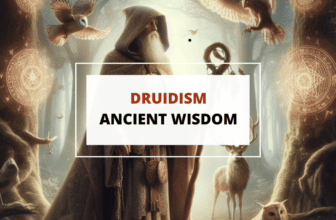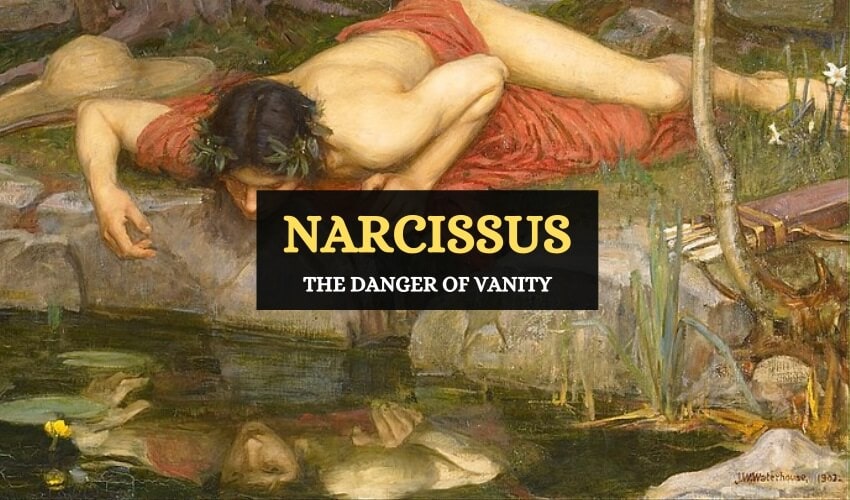
Table of Contents
In Greek mythology, beauty was always a strong theme, and the story of the handsome Narcissus was proof of it. His beauty and his arrogance would lead to his demise. Let’s take a closer look.
Who Was Narcissus?
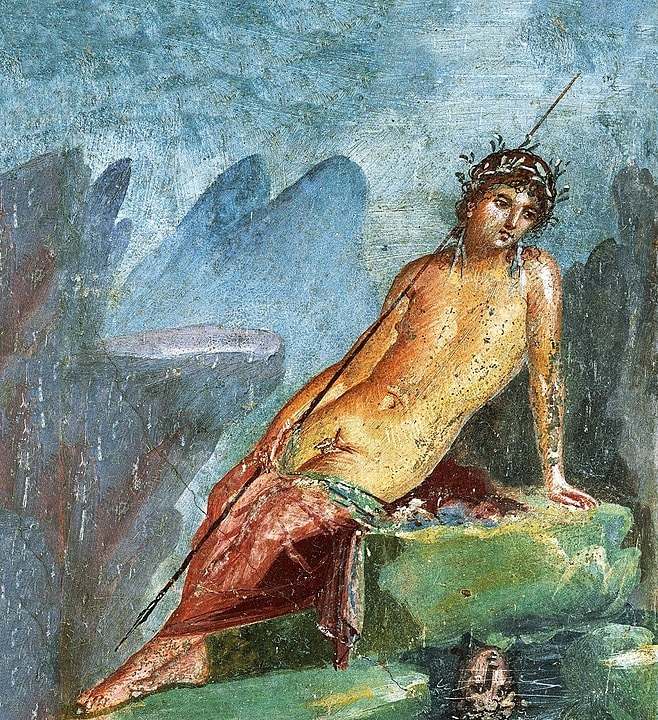
Narcissus was the son of the River god Cephissus and the fountain nymph Liriope. He lived in Boeotia, where people celebrated him for his astonishing beauty. In the myths, he was a young hunter who believed himself so beautiful that he rejected everybody who fell in love with him. Narcissus broke the hearts of a myriad of maidens and even a few men.
Prophecy of Narcissus’ Reflection
When Narcissus was born, the Theban seer Tiresias told his mother that he would live a long life, as long as he never knew himself. The meaning of this message was unclear. However, when Narcissus ultimately saw his reflection in the water, it became clear what the seer had warned against. The arrogant boy finally had found in his image someone beautiful enough for him and fell in love with his own reflection. So much so that he could neither eat nor drink and wasted away feeling the pain of unrequited love. This event would eventually lead to his death.
Narcissus and Echo
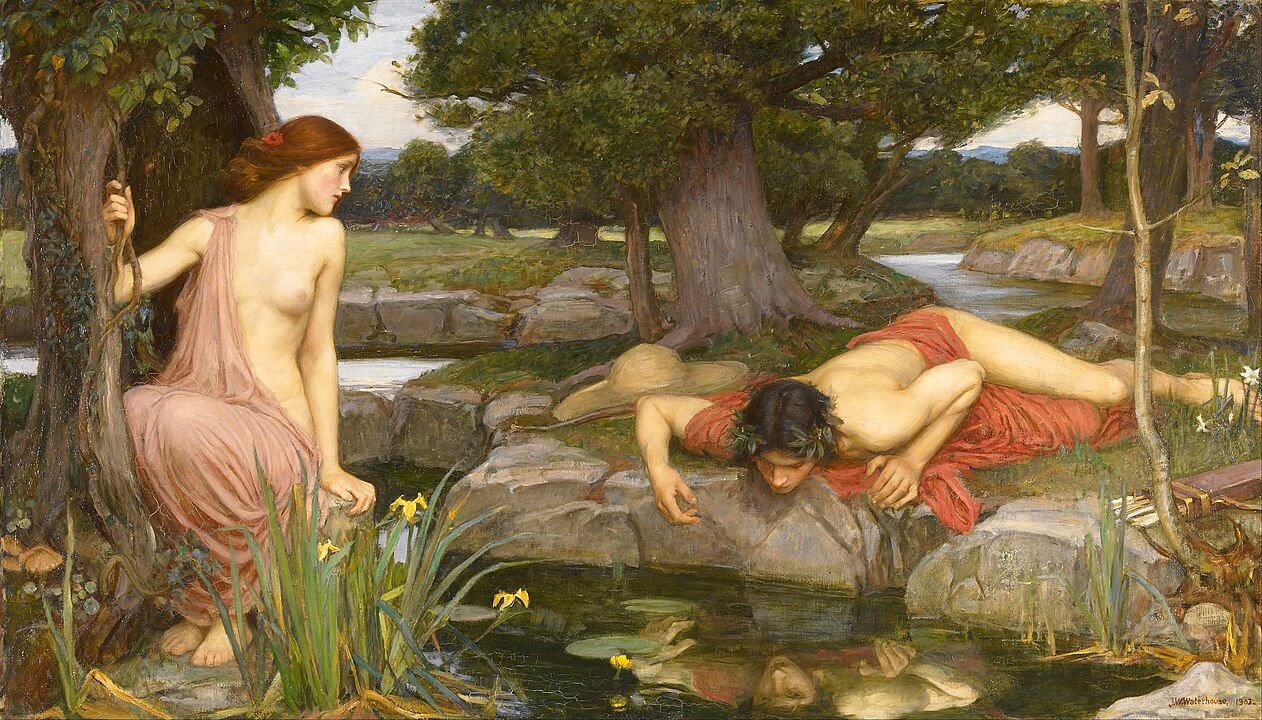
In Ovid’s Metamorphoses, the author tells the story of the mountain nymph Echo. Echo was cursed by Hera to repeat whatever she heard, because Echo had tried to distract and hide Zeus’ affairs with other nymphs from Hera. After being cursed, Echo wandered the woods simply repeating whatever she heard and no longer able to express herself. She found Narcissus walking around.
Narcissus was in the woods calling for his friends. He heard Echo’s voice repeating what he said but he couldn’t see her. When Echo saw Narcissus, she fell in love with him at first sight and started following him.
Narcissus was intrigued by the voice that he heard and called for it to show itself. When Echo ran towards him and embraced him, Narcissus rejected her, breaking her heart. In shame and dejection, Echo ran away to a cave, and there she died of sadness. Only her voice would remain on earth to repeat what she heard.
Nemesis saw what had happened and noticed Narcissus’ pride and arrogance. She then cursed him to fall in love with his own reflection. Narcissus would find a small pond in the woods and do just that.
Narcissus and Ameinius
Other myths tell a different story that does not include Echo. In some accounts, Ameinius was one of the suitors of Narcissus. Narcissus rejected his love, and Ameinius killed himself. Upon killing himself, Ameinius swore revenge and asked the gods to help him. Artemis, or in other stories, Nemesis, cursed Narcissus to fall in love with his reflection.
The Death of Narcissus
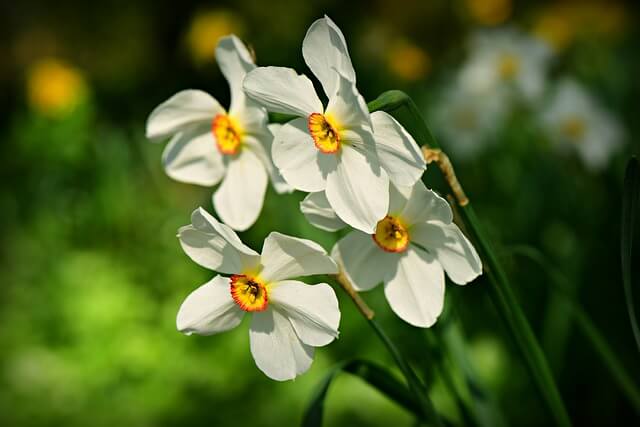
When Narcissus fell in love with his reflection, he stopped eating and drinking, amazed by his beauty. He did nothing but admire his reflection and remained by the pond, staring at himself. In the end, he died of thirst.
Other stories, however, propose that, he didn’t realize that he had fallen in love with his reflection. When he understood that the love he felt would never materialize, he felt distraught and committed suicide. After his death, the flower narcissus emerged in the place where he died.
Symbolism of Narcissus
In Greek mythology, there was a belief that looking at one’s reflection was unlucky, maybe even fatal. The myth of Narcissus could have originated due to these beliefs. The story was also a lesson of the dangers of vanity, over confidence and pride. Narcissus was proud and self-obsessed, which are traits that made people suffer the wrath of the gods.
Greek mythology is known to associate the myths with nature, and the flower narcissus would be a reminder of the fate of the beautiful man. Narcissus also had to do with the creation of echoes as we know them nowadays due to his encounter with the nymph Echo.
Narcissus in Artworks
The story of Narcissus was a relevant myth in Roman tradition. There are several artworks inspired by the beautiful Narcissus depicted staring at his reflection, with about 50 wall paintings in Pompei that depict his story. In the renaissance, Narcissus became famous once again due to the artworks of several artists. Caravaggio, for example, created an oil painting based on the story of Narcissus.
Narcissus in Psychology
In the field of psychiatry and psychoanalysis, Sigmund Freud used the myth of Narcissus as the basis for the narcissistic personality disorder. The term narcissism stands for a person who is emotionally immature and is overly concerned with his appearance. A narcissist needs to feel admired, has a sense of entitlement, and extreme self-importance.
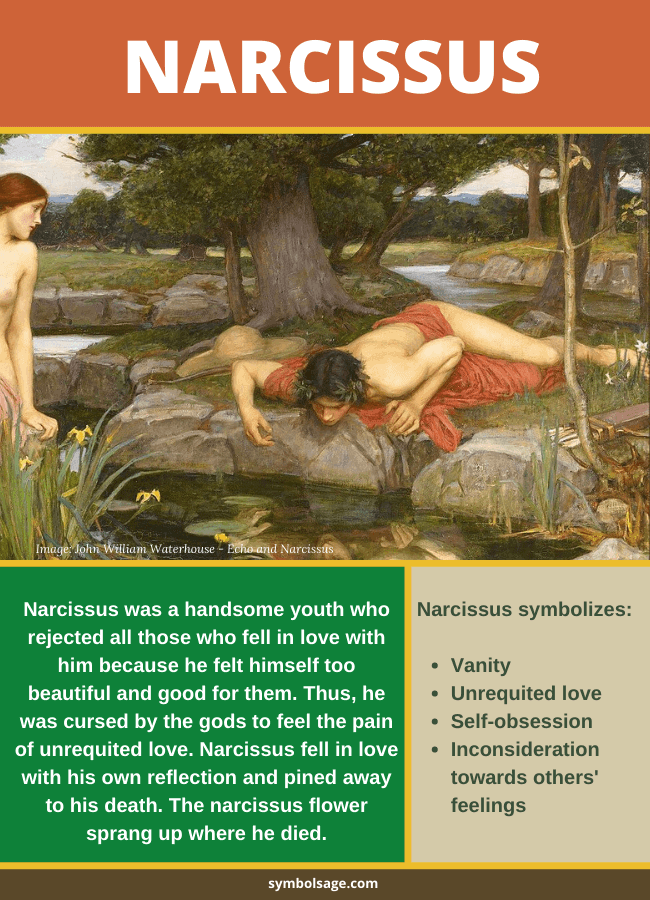
In Brief
Narcissus’ story had a moral for the people of Ancient Greece about the dangers of vanity and pride, and the importance of being respectful and considerate of the feelings of others. His myth would become essential in psychoanalysis and would give its name to a known psychological disorder and a flower.







